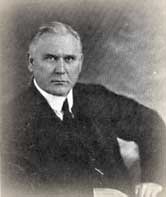 George W. Truett was born on this day, May 6,
1867 on a farm in the mountains of North Carolina. He became one
of the most popular boys in the county, equally handy on the farm, at
his desk or sighting down a rifle barrel.
George W. Truett was born on this day, May 6,
1867 on a farm in the mountains of North Carolina. He became one
of the most popular boys in the county, equally handy on the farm, at
his desk or sighting down a rifle barrel.Several times as a child and then as a young man, George recognized his need for a savior from his sins. But he was nineteen before he went forward, "confessing Christ before all the people." That very night he began to urge his classmates to turn to Christ. Many did. He was baptized, joined the Baptist church and began to teach Sunday school. Not only that, but, to pay his way through college, the young man opened a school, which soon enrolled 300 students and employed three teachers! He preached. Those who heard him speak called him a second Spurgeon. He was offered a church, but turned it down. He had decided to move with his parents to Texas. And Texas is where he made his mark for Christ.
The local Baptist church at Whitewright Texas decided to ordain him. George protested, but "there I was against a whole church..." He was ordained, but as of yet held no church. Instead, the 23-year-old accepted the position as chief financial officer of Baylor University because, "people do what he asks them to do." The school was deeply in debt by the standards of the day. In 23 months, George eliminated the debt completely. Later he was offered the school's presidency, but he turned it down, preferring to pastor a church.
At 30, George became pastor of the First Baptist Church of Dallas, Texas. He had wanted to turn it down, but felt God was saying, "take it." During his 47 years of leadership, the church grew from 715 members to over 7,000. Even after it was remodeled, a thousand people might be turned away from the doors on a given Sunday. It was the largest membership in the Southern Baptist denomination, the largest membership in the world (at that time) and highly influential. Other than his excellent speaking, another source of growth was his training program for Sunday school teachers.
People hung on George's words. In one sermon, he said "Our cities saved means the salvation of civilization. Our cities lost means the corruption and destruction of civilization." He then went on to show that the family is the key to the city. "As goes the home, so will go the city. And I pause to say that the home is in peril and endangered now as it has not been in modern times. ...If people trifle with the home they are undermining the foundation of an enduring and worthy civilization...Put crepe on the door of your heart if things are wrong in the family. Put crepe on the door." He always preached for a decision.
George almost left the pulpit once, however. He accidentally shot and killed one of his closest friends, the chief of police, in a hunting accident. Praying and crying, he could not bring himself to preach again, until in a vision he saw Christ saying "You are my man from now on." The night that he returned to the pulpit, other churches closed their doors so that their members could go hear him preach.
On his seventieth birthday he wrote his wife a letter in which he said, "I would this day rededicate my all to Christ..." Although greatly honored in his life, none of it went to his head. He died in 1944 after a painful illness.
Resources
- Ezell, John S. "Truett, George Washington." Dictionary of American Biography.
- Perez, Joan Jenkins. "Truett, George Washington." http://www.tsha.utexas.edu/handbook/online/ articles/view/TT/ftr16.html.
- Reese, Ed. George Truett. Christian Hall of Fame Series, #10. Glenwood, Illinois: Christian Hall of Fame Series, 1975.
- Truett, George Washington. "The Highest Welfare Of The Home." http://www.bibleteacher.org/gwt_4.htm.
- Various other internet articles.